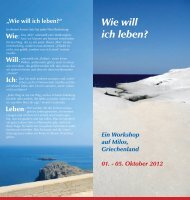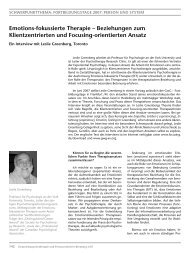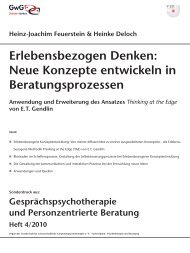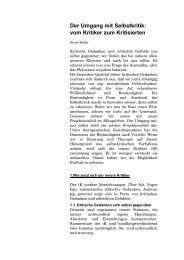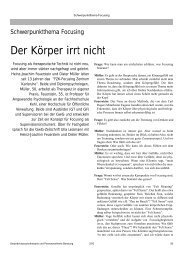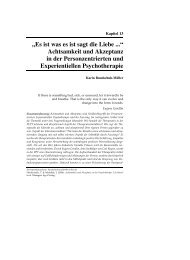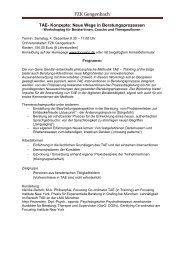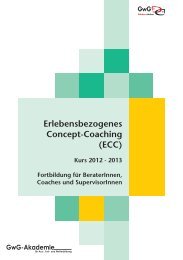FOCUS ON: Heijo Feuerstein and Dieter Müller - FOCUSING
FOCUS ON: Heijo Feuerstein and Dieter Müller - FOCUSING
FOCUS ON: Heijo Feuerstein and Dieter Müller - FOCUSING
You also want an ePaper? Increase the reach of your titles
YUMPU automatically turns print PDFs into web optimized ePapers that Google loves.
<strong>FOCUS</strong> <strong>ON</strong>: <strong>Heijo</strong> <strong>Feuerstein</strong> <strong>and</strong> <strong>Dieter</strong> <strong>Müller</strong><br />
Home | Newsletter Table of Contents | Previous Page of Newsletter | Next Page of<br />
Newsletter<br />
<strong>FOCUS</strong> <strong>ON</strong>: <strong>Heijo</strong> <strong>Feuerstein</strong> <strong>and</strong> <strong>Dieter</strong> <strong>Müller</strong><br />
<strong>Heijo</strong> <strong>Feuerstein</strong>, coordinator,<br />
Focusing-Trainer, Psychotherapist,<br />
is Co-director of the Focusing<br />
Zentrum Karlsruhe <strong>and</strong> professor<br />
for applied psychology at the FH<br />
Kehl, University for Applied<br />
Sciences (Public Management).<br />
by Ellen Kirschner, M.A., Member, USA<br />
Heinz-Joachim <strong>Feuerstein</strong> (<strong>Heijo</strong>) <strong>and</strong> <strong>Dieter</strong> <strong>Müller</strong><br />
met in the late 1970s while training as Client-<br />
Centered therapists in Heidelberg, Germany. While<br />
they shared common interests in psychology <strong>and</strong><br />
training, they were dissimilar in personality <strong>and</strong><br />
style. They saw that their differences<br />
complemented each other, <strong>and</strong> that together they<br />
would make a strong team.<br />
"My first experience with Focusing was really<br />
frustrating," recalled <strong>Heijo</strong>. "In 1978 I read a<br />
German book on Client-Centered therapy in which<br />
one chapter dealt with Focusing." <strong>Heijo</strong> tried out<br />
the instructions with a colleague <strong>and</strong> neither was<br />
very impressed. "But somehow," said <strong>Heijo</strong>, "I did<br />
not give up."<br />
<strong>Dieter</strong>, meanwhile, had his first taste of Focusing<br />
in a workshop given by Linda Olson. "I had always<br />
felt that something was missing in Client-Centered<br />
therapy," he said. When he experienced Focusing<br />
he felt right away that it filled the gap.<br />
"Sometimes in Client-Centered we got stuck in<br />
talking <strong>and</strong> did not get to the heart of the matter," he explained. "Focusing provided<br />
a way in."<br />
Eager to learn Focusing at the source, <strong>Heijo</strong> <strong>and</strong><br />
<strong>Dieter</strong> decided to find a way to go to Chicago. They<br />
approached the editor of the German edition of<br />
Psychology Today with a proposal to interview<br />
Gene, <strong>and</strong> he agreed. <strong>Dieter</strong> recalled their surprise<br />
when they arrived in Chicago in 1983. "I expected<br />
a big institute like the Client-Centered Institute in<br />
Germany," he said, "but all we found was a<br />
mailbox!"<br />
Their experience of Focusing, on the other h<strong>and</strong>,<br />
<strong>and</strong> of the way Gene worked with people, far<br />
exceeded their expectations. They were able to<br />
interview Gene in German, which enhanced their<br />
underst<strong>and</strong>ing.<br />
"I was impressed by the clear <strong>and</strong> fascinating way<br />
to Focus on real occurring inner processes," said<br />
<strong>Heijo</strong>, "not by exercises or playful devices, but really directly."<br />
From then on they returned every year to week-long trainings <strong>and</strong> conferences. In<br />
1986 they were certified as trainers, <strong>and</strong> the following year, with Rheinhard Fuchs<br />
http://www.focusing.org/newsletter/sif_1-2003/sif_1-2003-2.html<br />
Seite 1 von 3<br />
20.04.2008
<strong>FOCUS</strong> <strong>ON</strong>: <strong>Heijo</strong> <strong>Feuerstein</strong> <strong>and</strong> <strong>Dieter</strong> <strong>Müller</strong><br />
(who died prematurely in 1991) they founded their<br />
center, the Focusing Zentrum Karlsruhe (FZK). In<br />
1994 they organized the first International<br />
Conference to be held outside of Chicago in<br />
Pforzheim, Germany. It was held there again in<br />
1997 <strong>and</strong> 2000 <strong>and</strong> will return there this spring.<br />
Over the past 16 years, <strong>Dieter</strong> <strong>and</strong> <strong>Heijo</strong> have<br />
taught more that 1000 people to Focus. With Hans<br />
Jurgen Heringer, a linguist at the University of<br />
Augsburg, they developed CD-ROMS on<br />
Dreamwork, Coping with Chronic Pain, Decision<br />
Making, <strong>and</strong> guided imagery to further intercultural<br />
empathy.<br />
The main focus at the FZK is to cross the experiential approach with traditional<br />
concepts <strong>and</strong> psychological methods. It is not enough simply to add Focusing to other<br />
approaches, they explained. The goal is to redesign <strong>and</strong> rethink the traditional forms<br />
of the profession from the experiential viewpoint. For example, instead of<br />
Counselling, Coaching, Supervision <strong>and</strong> Focusing the FZK offers Experiential<br />
Supervision, Experiential Coaching, <strong>and</strong> Experiential Counseling. <strong>Dieter</strong> <strong>and</strong> <strong>Heijo</strong><br />
have always encouraged their trainees to create their own concepts. One graduate<br />
uses Focusing as part of a basic training for actors. Another has applied it to<br />
Speaking Circles. A new approach integrating Focusing with "hippo therapy" (therapy<br />
on horseback for hyperactive children) was developed by FZK graduate Kurt Schley.<br />
Kurt brought his horses to the last International in Germany to present his work.<br />
"My roots in Focusing go back to my initial client-centred training," said <strong>Heijo</strong>. "I got<br />
to know the depths of the experiential approach in steps. The vague concept of<br />
organismic valuing, which I knew from Carl Rogers, became very concise. The<br />
intensive experience with Focusing –as both client <strong>and</strong> therapist – transformed my<br />
underst<strong>and</strong>ing of change <strong>and</strong> relationship in all kinds of psychological work including<br />
therapy, supervision, coaching, training, <strong>and</strong> consulting.<br />
"Moreover, Gene's process concept of the felt sense was an example of something of<br />
general interest for me: how can we make a kind of concept that allows us to make<br />
precise use of psychological concepts in practice <strong>and</strong> every day life – not the naïve<br />
way that simple rules are made for everyone at anytime like certain rigid religious<br />
laws, but the art of bringing general concepts back into the specific experienced<br />
person-in-situation constellation, re-animating the canned life experience <strong>and</strong> making<br />
change by making sense? The felt body as the missing link between general concepts<br />
<strong>and</strong> the person-in-situation completes the process of pro-life change. This<br />
experiential approach has proven as helpful in my personal life as in my professional<br />
work<br />
Said <strong>Dieter</strong>, "Focusing is the core method for me, something that is always present,<br />
whether I am acting as therapist or supervisor. Other methods are used, but<br />
Focusing is the most important. For any big decisions in my life I have checked with<br />
Focusing. And the Focusing community is very special. In other scientific communities<br />
there is very much discussion <strong>and</strong> mind stuff. The Focusing community is more<br />
complete. Not only is there mind <strong>and</strong> thinking, but feelings, connection <strong>and</strong><br />
friendships -- everything.<br />
Newsletter Table of Contents | Previous Page of Newsletter | Next Page of<br />
Newsletter<br />
This page was last modified on 07 November 2003<br />
http://www.focusing.org/newsletter/sif_1-2003/sif_1-2003-2.html<br />
Seite 2 von 3<br />
<strong>Dieter</strong> commutes between<br />
Germany <strong>and</strong> Greece to teach<br />
Focusing. These lines are from a<br />
favorite poem which express his<br />
feeling about Greece. "Keep Ithaka<br />
always in your mind. Arriving there<br />
is what you are destined for. But<br />
do not hurry the journey at all.<br />
Better if it lasts for years, so you<br />
are old by the time you reach the<br />
isl<strong>and</strong>, wealthy with all you gained<br />
on the way, not expecting Ithaka to<br />
make you rich."<br />
by C. P. Cavafy<br />
20.04.2008
<strong>FOCUS</strong> <strong>ON</strong>: <strong>Heijo</strong> <strong>Feuerstein</strong> <strong>and</strong> <strong>Dieter</strong> <strong>Müller</strong><br />
Home | Learn Focusing | Focusing Partnership | Philosophy of the Implicit | Thinking At the Edge |<br />
Felt Community | Focusing <strong>and</strong> ... | Store | Contact Us | Site Map | Search<br />
All contents Copyright 2003 by The Focusing Institute<br />
Email comments to webmaster<br />
http://www.focusing.org/newsletter/sif_1-2003/sif_1-2003-2.html<br />
Seite 3 von 3<br />
20.04.2008



